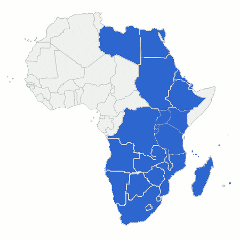Once negotiations on a Tripartite Free Trade Area (TFTA) are concluded it will be one of the largest free trade areas in the world with over 600 million people and presents a huge market for investors and traders.
The TFTA, which is composed of 26 countries from the East African Community, Common Market for East and Southern Africa and South African Development Community, will be helpful in boosting trade among African countries. The bloc is expected be launched during 2015. The region has a combined gross domestic product of $ 624 billion and makes up half of the African Union membership. It also contributes 58 per cent of the continent’s GDP and 57 per cent of the population of the African Union. At a forum to discuss the TFTA progress in Nairobi at the beginning of April, Joseah Rotich of the Kenyan Ministry of Foreign affairs said the pace of the tripartite negotiation process was hampered during the preparatory period by a number of factors including delays in submission of trade data and information required from the member states. Negotiations on the interpretation and application of the principles adopted by the summit have also been lengthy while resistance by some member states also led to delays in constituting the Technical Working Groups.Rotich said, “Delays in agreeing on the tariff liberalisation modalities due to reluctance of some member states, inadequate finance to support the negotiation process, lack of consistency in participation of experts in the negotiations and inflexibility at the technical level to establish the TFTA expeditiously are among the challenges. The proposed rules of origin (RoO) for the TFTA have now been crafted, which are expected to be simpler and easier to implement than the existing rules of origin for EAC, Comesa and SADC.”
The RoO set conditions that products should meet to be considered eligible for preferential treatment. Rotich adds, “A preferential or free trade area should have transparent, simple to implement rules that promote trade and guide against trade deflection. Strict rules of origin reduce the effectiveness of free trade agreements they apply to and these will be circulated for comments.” If properly implemented, the TFTA will have several benefits including the establishment of a larger market with a single economic space that will be more attractive to investment and large scale production and promotion of small and medium enterprises.






